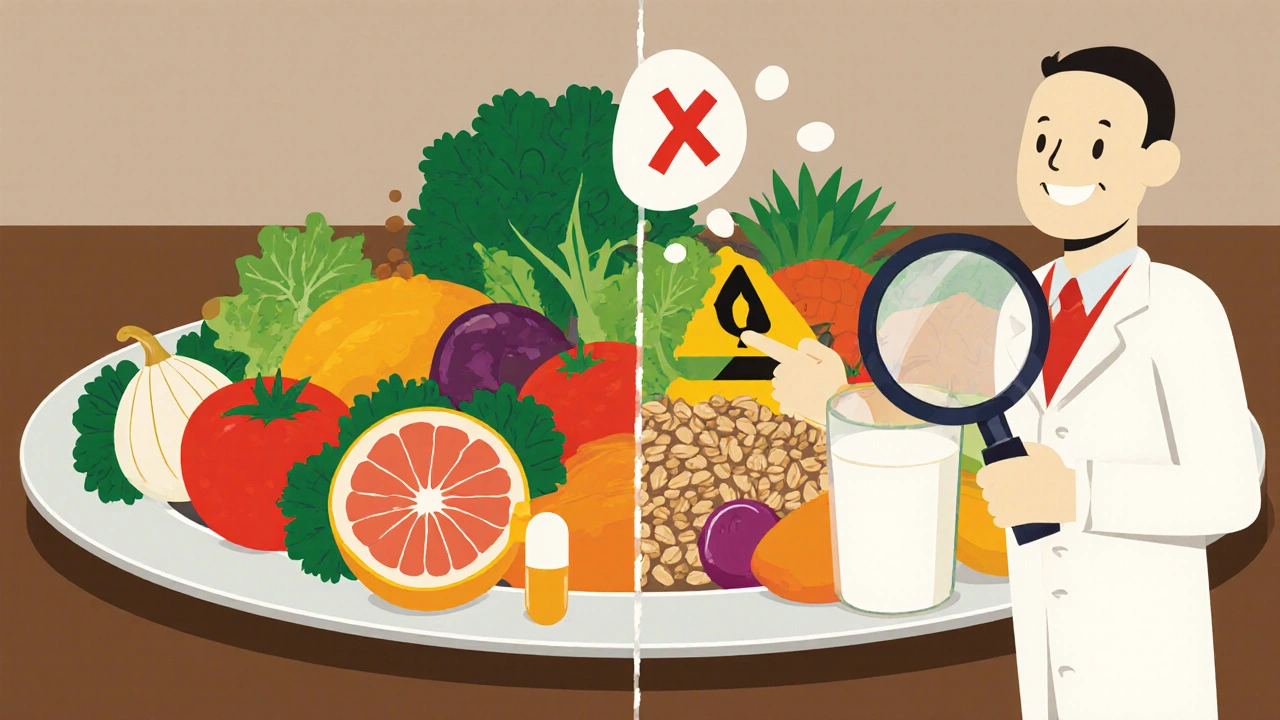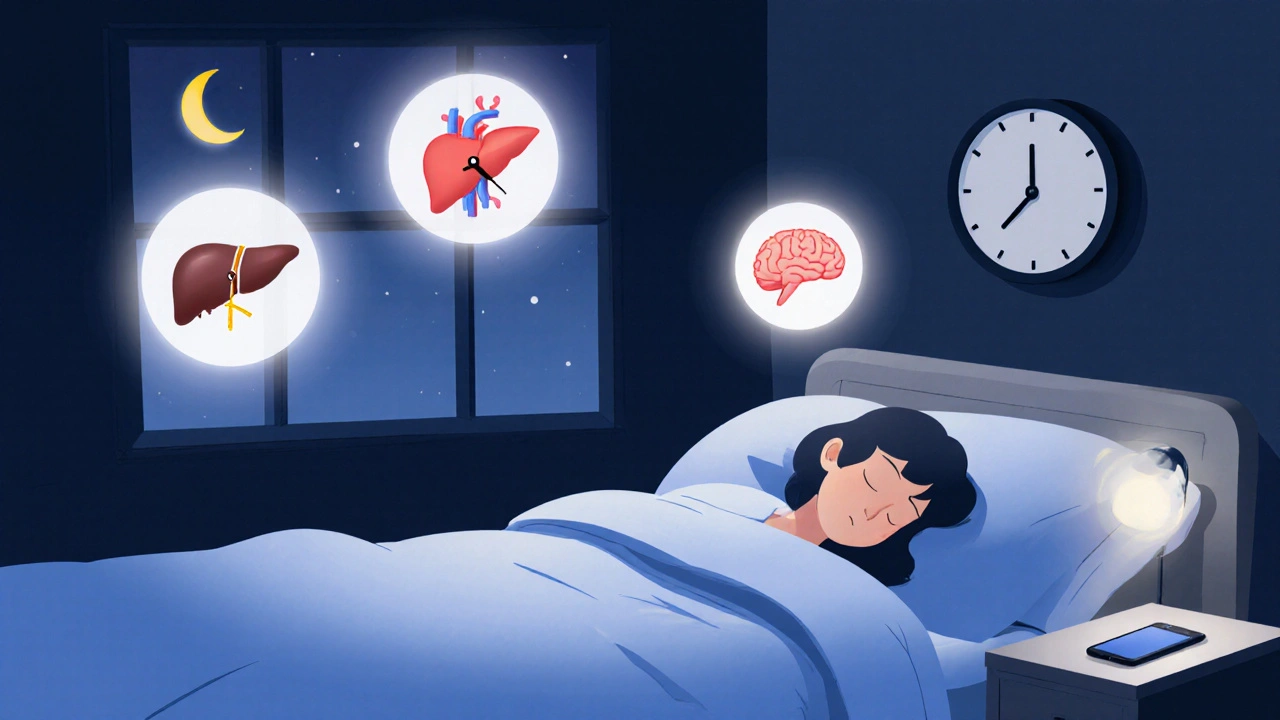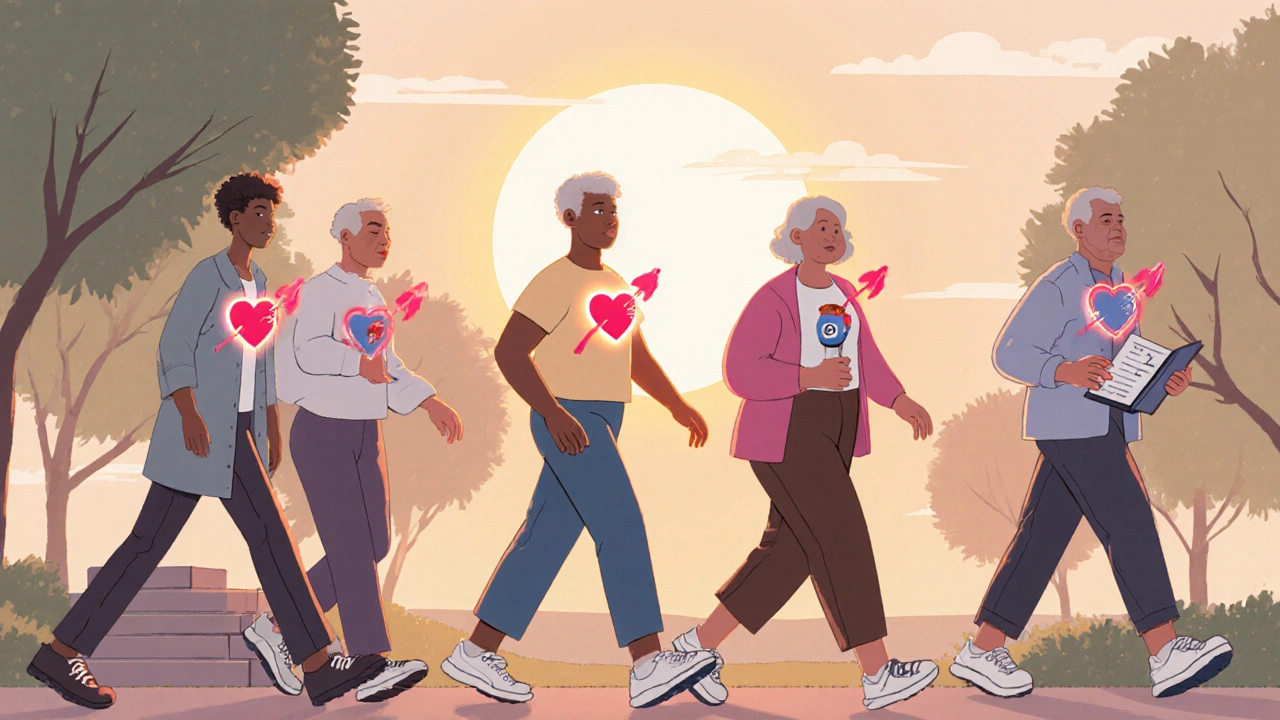Every year, over a million people in the U.S. end up in the emergency room because of bad reactions to their medications. Many of these cases aren’t caused by errors in prescribing-they’re caused by lifestyle. What you eat, how much you sleep, whether you move your body, and even what you drink can make your meds work better… or worse. The good news? You don’t need to quit your meds. You just need to tweak your daily habits.
Why Lifestyle Matters More Than You Think
Medications treat symptoms. Lifestyle changes fix the root cause. Take high blood pressure, for example. A pill lowers your numbers today. But if you keep eating salty chips, skipping walks, and sleeping only five hours a night, your body will keep fighting against that pill. The result? Higher doses, more side effects, and more pills stacked on top of each other.
This is called polypharmacy-taking five or more medications at once. People on multiple drugs are three times more likely to have a dangerous reaction. A 2022 study in the
Journal of the American Geriatrics Society found that just one extra pill can spike your risk of falls, confusion, kidney damage, and hospital stays. But here’s the flip side: when people make even small lifestyle changes, doctors can often reduce or even remove some of those pills.
Move More-Even a Little
You don’t need to run marathons. You don’t even need a gym. Just walk.
JenCare Medical Centers tracked patients with high blood pressure who walked 30 minutes, three days a week. Within three months, their systolic blood pressure dropped by an average of 10 points. That’s the same drop you’d see from a low-dose blood pressure pill. Some patients got off one medication entirely.
The science is clear: 150 minutes of brisk walking, cycling, or swimming each week improves heart function, lowers insulin resistance, and reduces inflammation. Add two days of light strength training-like lifting cans of soup or doing wall push-ups-and you double the benefits.
Start small. Park farther away. Take the stairs. Walk after dinner. Consistency beats intensity. Your body responds to regular movement, not occasional heroics.
Eat Smart, Not Strict
Forget fad diets. Focus on real food. For people with diabetes, a diet rich in non-starchy vegetables, beans, nuts, and whole grains can bring blood sugar down as much as metformin. For high blood pressure, cutting sodium to 1,500 mg a day (about two-thirds of a teaspoon) can lower pressure as much as a diuretic.
The DASH diet-Dietary Approaches to Stop Hypertension-isn’t a diet. It’s a way of eating. It means filling half your plate with vegetables and fruits, choosing lean proteins, and swapping white bread for whole grain. Studies in the
New England Journal of Medicine show it lowers blood pressure by 11/5 mm Hg. That’s not a small win.
But here’s the catch: some healthy foods can interfere with meds. Grapefruit ruins the effect of 85% of statins. Leafy greens high in vitamin K-like spinach and kale-can make blood thinners like warfarin less effective. Dairy can block absorption of antibiotics like tetracycline.
Don’t guess. Talk to your pharmacist. Bring your meds and your food diary to your next appointment. They’ll tell you what to avoid and what’s safe.
Sleep Like Your Life Depends on It
It does.
If you regularly get less than seven hours of sleep, your body releases stress hormones that raise blood pressure, spike blood sugar, and increase belly fat. That’s why sleep deprivation is linked to diabetes, heart disease, and obesity-all conditions you’re probably taking meds for.
A 2023 study showed that people who slept seven to nine hours a night needed 20% fewer medications for chronic conditions than those who slept five or six. Why? Because your body repairs itself while you sleep. Hormones balance. Inflammation drops. Insulin sensitivity improves.
Try this: turn off screens 90 minutes before bed. Keep your room cool (around 18°C). Get sunlight in the morning. Even 10 minutes helps reset your internal clock. No magic pills. Just better sleep.

Quit the Bad Habits-One at a Time
Smoking, heavy drinking, and chronic stress don’t just harm your health. They make your meds work less effectively.
Smoking narrows your arteries. That makes blood pressure meds less effective. It also increases the risk of heart attack and stroke-especially if you have diabetes. Quitting smoking cuts your heart disease risk by half within one year.
Alcohol? Limit it. One drink a day for women. Two for men. More than that raises blood pressure, damages your liver, and can cause dangerous interactions with painkillers, antidepressants, and diabetes drugs.
Stress is the silent killer. It raises cortisol, which raises blood sugar and blood pressure. Meditation, yoga, or even 10 minutes of deep breathing each day can lower stress hormones. A 2024 UC Davis study found that patients who practiced daily breathing exercises reduced their need for anxiety meds by 30% over six months.
Track It-But Don’t Obsess
You won’t see results overnight. Lifestyle changes take 3 to 6 months to show measurable effects. Medications work in days. That’s why people give up. They think it’s not working.
Use a simple tracker. Write down your daily steps, meals, sleep hours, and how you feel. Apps help-but a notebook works too. After eight weeks, you’ll start to see patterns. Maybe you sleep better after skipping dessert. Maybe your blood pressure drops after you walk on weekends.
Digital tools are making this easier. Wearables and apps that track diet, movement, and sleep improve adherence by nearly 50% compared to going it alone. You don’t need to be perfect. You just need to be consistent.
Never Stop Talking to Your Doctor
This isn’t about replacing meds. It’s about working with them.
Harvard Medical School’s Dr. Rob Shmerling says it plainly: “Medications should be
in addition to lifestyle changes, not
instead of them.”
Never stop or change your meds on your own. If you feel better, tell your doctor. They might lower your dose. Or remove one. But only they can do it safely.
A patient in Melbourne, Australia, named Lisa, cut her blood pressure meds from three pills to one after six months of walking, reducing salt, and sleeping better. Her doctor monitored her closely. Her BP stayed stable. Her energy improved. She felt like herself again.
That’s the goal: not just surviving on pills-but thriving without them.

What If You Can’t Change Everything?
You don’t have to fix everything at once.
One person started by just walking 10 minutes after dinner. Another swapped soda for sparkling water. Another began turning off their phone an hour before bed. These small wins add up.
The American Heart Association found that 68% of people with chronic conditions felt better-physically and emotionally-after making even one lifestyle change alongside their meds.
You’re not failing if you slip. You’re human. The goal isn’t perfection. It’s progress. One better choice today. Another tomorrow. Over time, your body starts to heal. Your meds start to work better. And you start to feel like you’re not just managing illness-you’re reclaiming your life.
Real Stories, Real Results
On Reddit, a user named HypertensionWarrior lowered their blood pressure from 150/95 to 125/80 in six months by walking daily and cutting sodium. Their doctor took them off one pill.
Another user, DiabetesJourney, struggled with diet changes. “The social isolation was harder than the meds,” they wrote. But after joining a local cooking class for people with diabetes, they found community-and stuck with it.
These aren’t outliers. They’re proof that lifestyle changes work-when they’re realistic, supported, and sustained.
The Bigger Picture
The American College of Lifestyle Medicine now has over 12,000 certified practitioners. Medicare Advantage plans are starting to cover lifestyle programs. Employers are seeing lower healthcare costs when workers eat better, move more, and sleep well.
By 2030, experts predict 60% of chronic disease care will combine meds with structured lifestyle plans. Why? Because it works. And it’s cheaper.
You’re not just reducing your risk of side effects. You’re reducing your risk of hospital stays, disability, and early death. You’re taking back control-not from your meds, but from the habits that made you need them in the first place.



Jessica Healey
November 18, 2025 AT 01:01I used to take four meds for BP and diabetes, and honestly? I felt like a walking pharmacy. Then I started walking after dinner and swapping soda for sparkling water. No magic. Just consistency. Six months later, my doc cut me down to one pill. I still take it, but I feel like ME again.
Also, grapefruit is a TRAP. Learned that the hard way.
Levi Hobbs
November 18, 2025 AT 14:05This is so important-and so under-discussed. I’ve seen patients in my clinic go from polypharmacy to minimal meds just by walking 20 minutes a day, sleeping 7+ hours, and cutting processed sugar. The science isn’t new-but the cultural focus on pills over habits is absurd. Lifestyle isn’t a ‘bonus’-it’s the foundation. And yes, your pharmacist can tell you what foods clash with your meds. Ask them. They’re not just the guy who hands you the bottle.
henry mariono
November 18, 2025 AT 17:07I’ve been trying to sleep better. Turned off screens at 10:30, kept the room cool. Didn’t expect much. But after two weeks, I’m waking up without that foggy head. Still take my BP med. But I don’t feel like I’m just surviving anymore. Just… quieter. Better.
Sridhar Suvarna
November 19, 2025 AT 16:20India has over 200 million diabetics. Most are on metformin. But in villages, people still eat millet, walk to the well, sleep with the sun. Their HbA1c is lower than urban patients on the same meds. Why? Because their lifestyle never left them. We don’t need to ‘change’-we need to remember. Simple. Real. Human.
Also, yoga is not a trend. It’s a tool. Use it.
Joseph Peel
November 21, 2025 AT 05:34The DASH diet isn’t trendy-it’s evidence-based. And it’s not about restriction. It’s about abundance: colorful vegetables, legumes, nuts, whole grains. It’s how humans ate for millennia before processed food companies existed. The fact that we need a ‘diet’ to do this is tragic. But it’s also empowering. You don’t need a doctor’s permission to eat an apple.
Kelsey Robertson
November 22, 2025 AT 12:42Oh, so now we’re blaming patients for needing meds? Let me guess-next they’ll say obesity is just ‘lack of willpower’ and cancer is ‘bad vibes’? This is dangerous oversimplification. Some people have genetic conditions. Some have thyroid issues. Some are on meds because their bodies don’t work right-no matter how many kale smoothies they drink. Don’t glorify ‘natural’ and shame people who need pharmaceutical help. That’s not health-it’s moralism.
Joseph Townsend
November 23, 2025 AT 05:41Let me tell you something-I was a walking zombie on 5 meds. Sleep-deprived. Craving sugar. Stressed to hell. Then I started doing 10 minutes of deep breathing before bed. No joke. I cried the first night. Not from sadness-from relief. My anxiety med? Gone. My BP med? Halved. I didn’t ‘fix’ myself. I just stopped fighting my body. And guess what? It stopped fighting back. Life’s not about perfection. It’s about listening. And sometimes, that means silence.
Bill Machi
November 23, 2025 AT 19:41Why are we letting Big Pharma push this ‘lifestyle’ nonsense? They make billions on pills. They don’t care if you walk or sleep. They care if you keep buying. This article smells like corporate wellness propaganda. If lifestyle changes were so effective, why aren’t insurance companies paying for gyms instead of statins? Wake up. This isn’t about health. It’s about profit.
Elia DOnald Maluleke
November 24, 2025 AT 13:55In South Africa, we say: ‘Ubuntu-umntu ngumntu ngabantu.’ I am because we are. This isn’t just about individual discipline. It’s about community. My neighbor taught me to cook beans with turmeric instead of salt. We walk together at dusk. We talk. We laugh. We forget we’re sick. That’s the real medicine. Not the pill. Not the app. The connection. The shared breath. The quiet solidarity of healing together.
satya pradeep
November 24, 2025 AT 18:36bro i tried walking 30 mins but my knees hurt so i switched to swimming. 2x a week. lost 12 lbs. bp down. doc said i can drop one med next visit. also grapefruit = bad. learned that when my med turned orange in my mouth. lol. ps: sleep is king. if you sleep bad, nothing else matters. just sayin.
Prem Hungry
November 25, 2025 AT 06:26Dear friend, you are not alone. Many in India and across the world struggle with this. But small steps-yes, even one step-are sacred. Start with one meal. One walk. One hour of sleep. Do not rush. Healing is not a race. Your body remembers kindness. It responds to patience. You are doing enough. Keep going. You are stronger than you think.
Leslie Douglas-Churchwell
November 26, 2025 AT 09:32Wake up. The FDA, Big Pharma, and the CDC are all complicit in this ‘lifestyle’ sham. It’s a distraction. They know that real healing-like fasting, infrared therapy, and grounding-is suppressed. You think walking helps? Try 72-hour water fasts with Himalayan salt and red light therapy. That’s real biohacking. Your meds? They’re designed to keep you dependent. Your sleep tracker? Probably harvesting your biometric data for the surveillance state. You’re being manipulated. Break the cycle. Go off the grid. Heal yourself. The system doesn’t want you well. It wants you compliant.